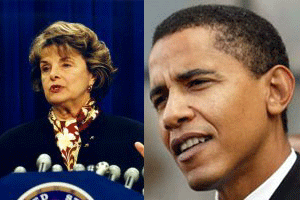A Swamp of Their Own
Democrats in Congress are split over proposed anti-corruption legislation that would limit lobbyists' access to lawmakers. Critics say the law doesn't go far enough to address "earmarks" and campaign finance problems, and argue that an independent watchdog should be formed to enforce the rules.
Democrats in Congress are split over proposed anti-corruption legislation that would limit lobbyists’ access to lawmakers. Critics say the law doesn’t go far enough to address “earmarks” and campaign finance problems, and argue that an independent watchdog should be formed to enforce the rules.
Your support matters…New York Times:
Some Democrats say their election is a mandate for more sweeping changes, and many newly elected candidates — citing scandals involving several Republican lawmakers last year — made Congressional ethics a major issue during the campaign. After winning the House on election night, Representative Nancy Pelosi, the House Democratic leader, promised “the most honest, most open and most ethical Congress in history.”
Senator Barack Obama, an Illinois Democrat tapped by party leaders last year to spearhead ethics proposals, said he was pushing for changes with more teeth. “The dynamic is different now,” Mr. Obama said Friday. “We control both chambers now, so it is difficult for us to have an excuse for not doing anything.”
He is pushing to create an independent Congressional ethics commission and advocates broader campaign finances changes as well. “We need to make sure that those of us who are elected are not dependent on a narrow spectrum of individuals to finance our campaigns,” he said.
Sweeping change, however, may be a tough sell within the party. Representative John P. Murtha, Democrat of Pennsylvania, was embarrassed by disclosures last week that he had dismissed the leadership proposals with a vulgarity at a private meeting. But Mr. Murtha is hardly the only Democrat who objects to broad changes.
Senator Dianne Feinstein, the California Democrat who will oversee any proposal as the incoming chairwoman of the Rules Committee, for example, said she was opposed to an independent Congressional ethics watchdog. “If the law is clear and precise, members will follow it,” she said in an interview. “As to whether we need to create a new federal bureaucracy to enforce the rules, I would hope not.”
Other Democratic lawmakers argued that the real ethical problem was the Republicans, not the current ethics rules, and that the election had alleviated the need for additional regulations. “There is an understanding on our side that the Republicans paid a price for a lot of the abuses that evolved,” said Representative Barney Frank, Democrat of Massachusetts, alluding to earmarks. Senator Tom Harkin, an Iowa Democrat and a senior member of the Appropriations Committee, said the scandals of the current Congress were “about the K Street Project for the Republicans,” referring to the party’s initiative to put more Republicans in influential lobbying posts and build closer ties to them.
Independent journalism is under threat and overshadowed by heavily funded mainstream media.
You can help level the playing field. Become a member.
Your tax-deductible contribution keeps us digging beneath the headlines to give you thought-provoking, investigative reporting and analysis that unearths what's really happening- without compromise.
Give today to support our courageous, independent journalists.






You need to be a supporter to comment.
There are currently no responses to this article.
Be the first to respond.